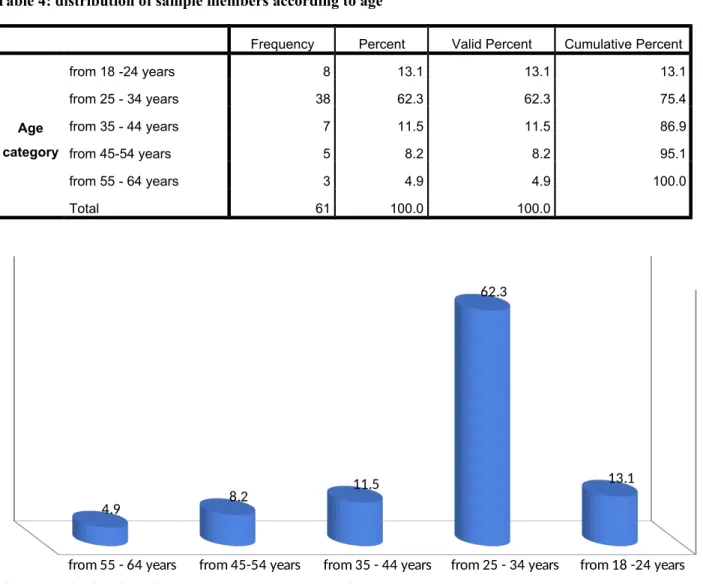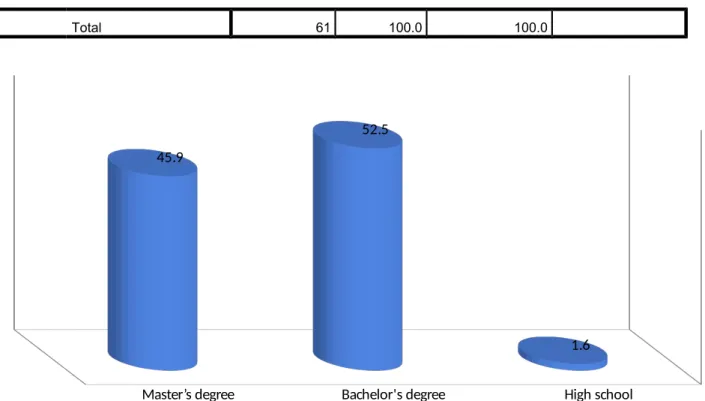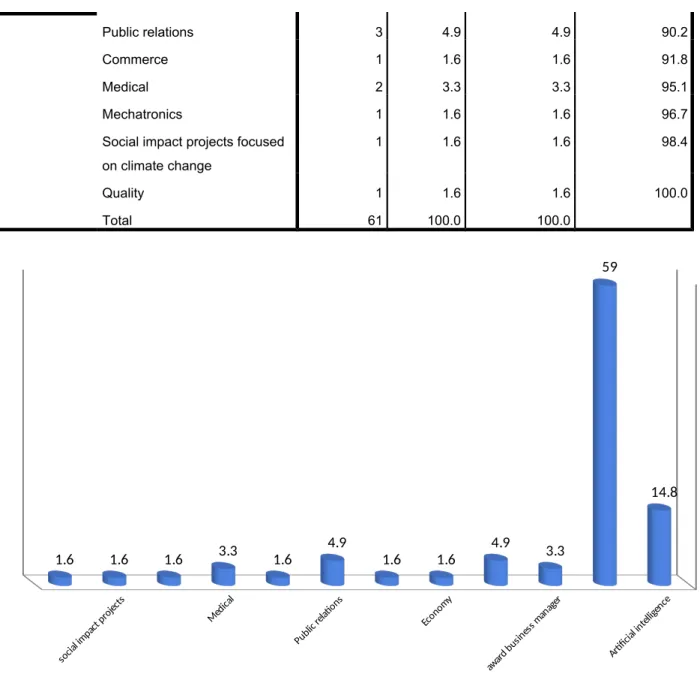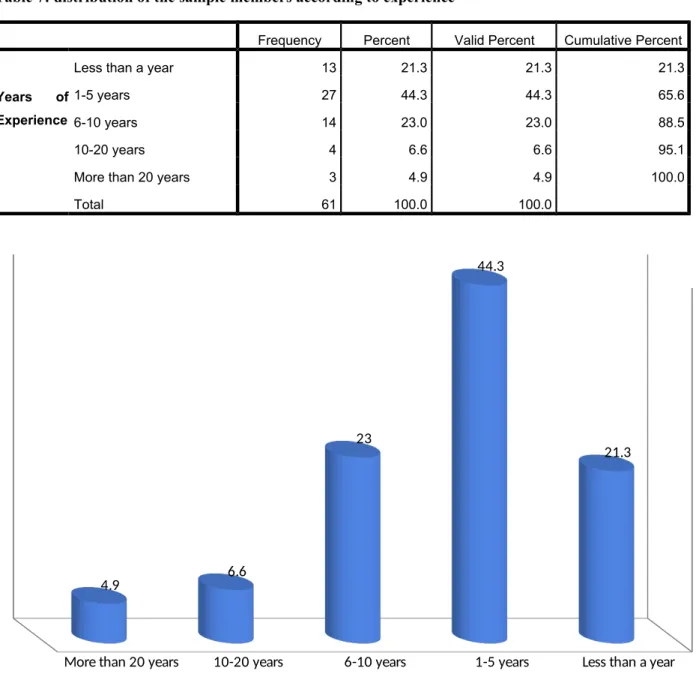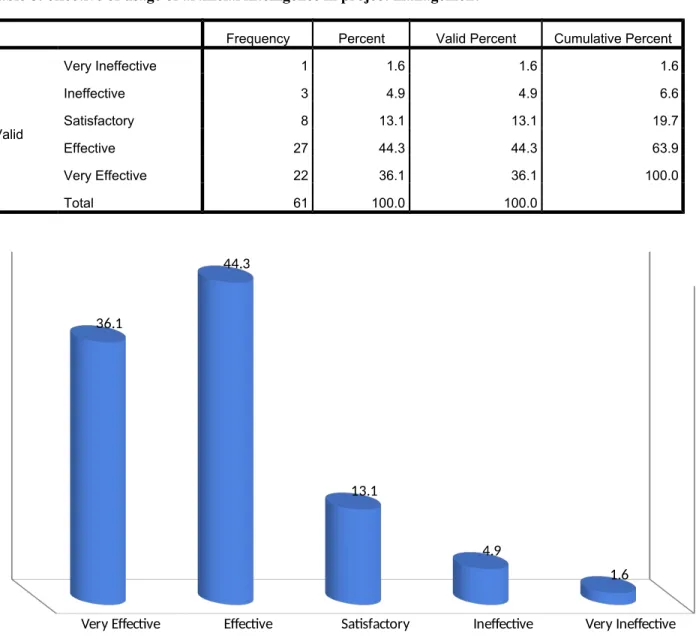The author whose copyright is indicated on the title page of the work has granted the British University in Dubai the right to loan his/her research work to users of the library and to make partial or separate copies for use in teaching and research. The author has also granted permission to the University to store or make a digital copy for similar use and for the digital preservation of the work. This research aims to identify the emerging risks of implementing artificial intelligence (AI) in project management.
The questionnaire was divided into two parts, the first part was to help understand the background of the participants and the second part was to assess the impact of emerging risks of AI implementation on project management. The research helped develop a better understanding of how to minimize the impact of identified risks on project management to ensure successful delivery of results.
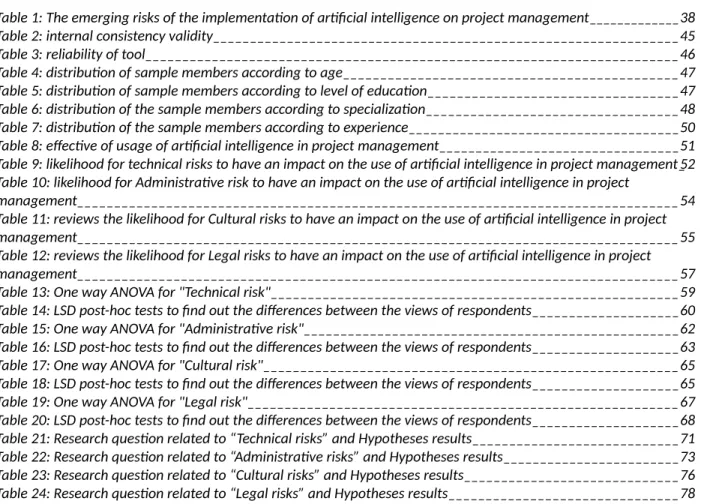
CHAPTER ONE: INTRODUCTION
- Introduction
- Literature review
- Research methodology
- Data Analysis and Discussion
- Conclusions and recommendations
What are the new legal risks of implementing artificial intelligence in project management. What are the new administrative risks when implementing artificial intelligence in project management. What are the new technical risks of implementing artificial intelligence in project management.
What are the new cultural risks of implementing artificial intelligence in project management. This research aims to identify the new risks of implementing artificial intelligence in project management.
CHAPTER TWO: LITERATURE REVIEW
Different companies and industries are moving towards the use of artificial intelligence to improve their capabilities. A balance between the use of artificial intelligence and the application of human skills is extremely important to follow in the future to achieve the best results. Artificial intelligence risks can be defined as challenges caused by artificial intelligence systems that lead to the project failing or delivering the result (Lahmann & Stierli, 2020).
Furthermore, one of the main technical risks associated with artificial intelligence systems is that all artificial. One of the management risks is that implementing artificial intelligence systems is expensive and requires dedicated time, as it requires research and experimentation (Osten, 2021).
CHAPTER THREE: RESEARCH METHODOLOGY
This technique was applied in this research to understand the perspective of groups that work in the field of project management and artificial intelligence in the public and private sector or at least have experience in managing projects and the use of artificial intelligence in different sectors and areas. This research identifies four main categories of risks that affect the implementation of artificial intelligence on project management. Artificial intelligence risks in project management can be defined as challenges that can occur and are caused by the application of artificial intelligence systems that lead to the failure of the project (Lahmann & Stierli, 2020).
Administrative risks: can be defined as challenges associated with the management method of applying artificial intelligence to project management such as human errors, liability and training requirements (Chowdhury & Sadek, 2012). Measurement Measuring the influence of new risks of artificial intelligence implementation on project management. The first section focused on collecting general information about the participants such as age, level of education, specialization, years of experience and their general opinion on the effectiveness of the use of artificial intelligence in project management.
The second section will help to make an assessment of the risks arising from the use of artificial intelligence in project management. The first is a review of the available literature in the field of artificial intelligence and project management. The information obtained from the literature review helped develop the information base regarding the impact of risks arising from the use of artificial intelligence in project management.
Questionnaire questions were developed based on information gathered from the literature review regarding risk factors associated with the use of artificial intelligence in project management. The final stage in this research was to draw conclusions and develop discussions based on the collected data to understand the effect of using artificial intelligence technologies in project management. The One-way ANOVA test was used to explain whether there were significant differences between the respondent's perceptions of risk factors associated with the use of artificial intelligence in project management.
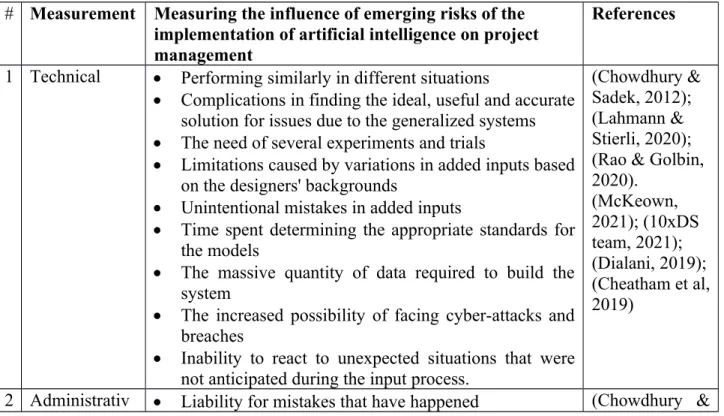
CHAPTER FOUR: DATA ANALYSIS AND DISCUSSION
The results show that 1.6% of respondents have seen that the use of artificial intelligence in project management is too much. While the sample members cannot determine whether the remaining technical risks can have an impact on the use of artificial intelligence in project management. The sample members cannot determine whether the remaining administrative risk can have an impact on the use of artificial intelligence in project management.
The results indicate that the overall average of the likelihood of cultural risk impacting the use of artificial intelligence in project management is 2.73 degrees. The sample members cannot determine whether the remaining cultural risks could have an impact on the use of artificial intelligence in project management. The results indicate that the overall average of the likelihood of legal risks impacting the use of artificial intelligence in project management is 2.8 degrees.
The sample members cannot determine all legal risks that may impact the use of artificial intelligence in project management. For AR2, there were significant differences between "Project Management" and "Artificial Intelligence" in favor of Project Management where the mean difference = 1. For CR2, there were significant differences between "Project Management" and "Artificial Intelligence" in favor of Project Management where the mean difference = 1.
The main objective of this research is to identify the new risks of implementing artificial intelligence in project management. In addition to studying the perception of users from different specializations of risk categories of the use of artificial intelligence in project management. The second objective concentrated on identifying the new risks of implementing artificial intelligence in project management.
The literature review has confirmed that the use of artificial intelligence in project management will develop the field. It also discussed the main findings and provided recommendations to facilitate the use of artificial intelligence in project management.
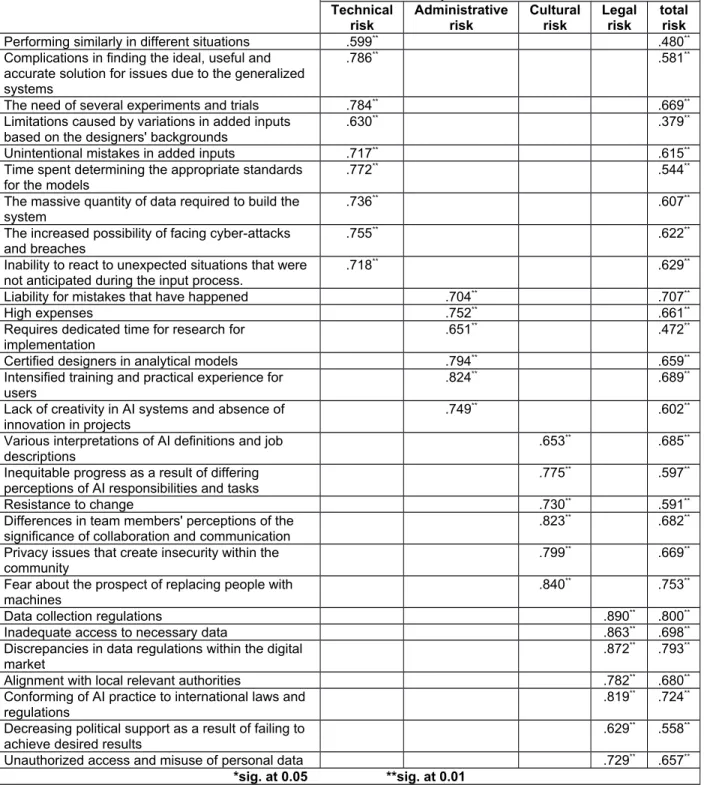
CHAPTER FIVE: CONCLUSIONS
The literature has explained how artificial intelligence has helped develop the project management field. Transition plans will need to be designed to deliver successful results throughout the AI adoption journey. In addition, the literature explains that artificial intelligence will reduce project risks, but it describes that risks have been created by the application of artificial intelligence in project management.
The available information in the literature has facilitated the identification of gaps by researching and understanding the emerging risks of using artificial intelligence in project management. The choice of data collection method and sample group added value to the research and supported the understanding of the emerging risks of using artificial intelligence in project management. The responses show that participants from different specializations had different concerns about these two factors from the technical category, which are “TR3: Need for more trials and attempts” and “TR5: Unintentional errors in added inputs”.
The responses show that participants from different specializations had different concerns about this factor than the administrative category, which is “AR2: high costs”. Concerns may be due to a lack of knowledge about the effect of artificial intelligence that can positively influence project outcomes. The responses show that participants from different specializations had different concerns about this factor from the cultural category, which is "CR2: Unfair progress as a result of different perceptions of the responsibilities and tasks of artificial intelligence".
The responses show that participants from different specializations had different concerns about this factor from the legal category which is "LR1: Data collection rules". The risks mentioned in this research do not cover all risks and categorizations that may arise due to the application of artificial intelligence in project management. There are many areas that could be explored under the topic of “impact of emerging risks of artificial intelligence implementation on project management”.
Available at: https://www.mckinsey.com/business-functions/mckinsey-analytics/our-insights/confronting-the-risks-of-artificial-intelligence. Available at: https://www.mckinsey.com/business-functions/mckinsey-analytics/our-insights/the-economics-of-artificial-intelligence. Available at: https://www.darzin.com/blog/how-to-manage-stakeholder-. 2021) Project management skills for the future.
Available at: https://project-management.com/project-management-phases/. Advantages and disadvantages of artificial intelligence. https://www.simplilearn.com/advantages-and-disadvantages-of-artificial-intelligence- article. Available at: https://www.arup.com/-/media/arup/files/publications/f/arup_future-of-project-management2.pdf. Available at: https://www.epicflow.com/blog/how-ai-will-change- the-future-of-project-management/. Artificial intelligence is changing work—and executives must adapt.
Available at: https://monday.com/blog/project- management/project-management-trends-reshaping-work/. What is Project Quality Management? Available at: https://theprojectoffice.org/artificial-intelligence-in-project-management-68ddf2ad91d7. 2015) Using and Interpreting Cronbach's Alpha. Available at: https://www.modis.com/en-be/insights/blog/how-artificial-intelligence-can-help-in-project-management/. 10 Great Project Management Leadership Skills.
Available at: https://www.auditboard.com/blog/what-are-risks-artificial-intelligence/. Questionnaire: definition, examples, design and type. Available at: https://rindle.com/blog/10-project-management-challenges-and-how-to-overcome-them-effectively. 2019). Available at: https://www.bcs.org/articles-opinion-and-research/using-ai-to-increase-project-management-maturity/.
Appendices
As is the case with many questionnaire surveys, some questions may seem irrelevant or impertinent. However, in this study it is imperative that all questions be answered as the questionnaire is designed to achieve certain research goals and it is hoped not to offend the participants in any way. Completing the questionnaire takes no longer than 10 minutes and provides essential information for my research.
The research aims to identify the emerging risks of implementing artificial intelligence in project management. The study will contribute by ranking the risks associated with the use of artificial intelligence in project management based on their influence and effect on projects. What is the likelihood that the following technical risks will have an impact on the use of Artificial Intelligence in project management.
How likely are the following administrative risks to affect the use of artificial intelligence in project management?
